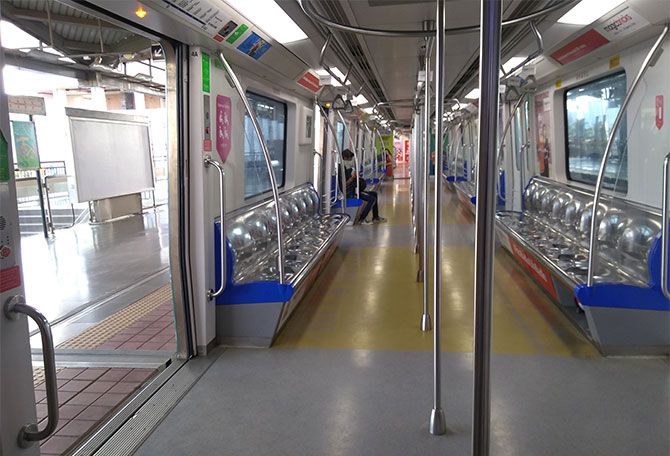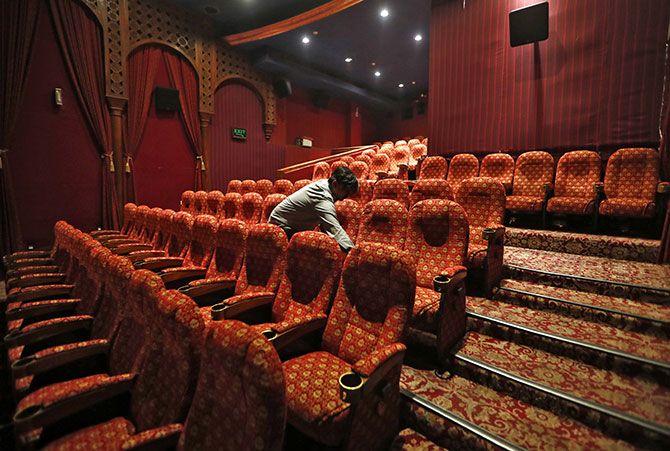'Tens of millions will be working from home for months at a time, which means the smartest brains in business will be focussed on creating more efficient WFH processes,' predicts Devangshu Datta.

A popular sub-genre of science fiction is the 'post-apocalyptic' novel.
In these, the author assumes a disaster and imagines how the world will cope in the aftermath.
It could be nuclear war; it could be climate change; it could be an alien attack; it could be a killer disease.
COVID-19 doesn't qualify as a killer disease like the flu described in Stephen King's The Stand or the alien disease Michael Crichton dreamt up in The Andromeda Strain.
Covid-19 has a relatively low mortality rate.
It is far less lethal than real-life Ebola, Nipah and SARS.
Despite the lower mortality rate, COVID-19 will, however, change the world in ways that those diseases did not.
Ebola, Nipah, SARS and MERS, et al, were contained outbreaks.
COVID-19 is not.
It started in China and has since spread to every major country.
The economic damage is far greater, and the absolute death-toll magnitudes more.

The post-COVID-19 era will be different in several significant ways from the world in November 2019.
Industries will re-engineer their internal work processes and retool supply chains.
Some service industries will practically evaporate, though they will surely rise again, in different avatars.
Policymakers will have to rethink accepted wisdom on handling public transport and healthcare.
Insurers will have to review premium assumptions.
Manufacturers around the world have been hit by the lack of critical components out of China.
They have already started creating better models for identifying critical gaps and weaknesses in their supply chains.
Multinational corporations will surely find ways to diversify supply chains across regions to ensure that they are better prepared the next time something like this happens.
This will add to costs: China is a hub because it is the cheapest and most efficient manufacturer of anything at scale.

Second, manufacturers will look at ways to sanitise workspaces, and factories, and embed a paradigm of social distancing in corporate work culture.
Any labour-intensive industry will have to figure this out.
Whether it's a construction site, a warehouse, a server ant-farm, or a textile sweat-shop, no business can live with the possibility that workers placed cheek by jowl will be infected en masse.
Insurers who are now looking at writing pandemic disruption policies will not be happy with current work processes, which means lenders will also be unhappy, which means businesses have strong incentives to change.
The office, as a management centre, will probably decline in importance.
Tens of millions will be working from home for months at a time, which means the smartest brains in business will be focussed on creating more efficient WFH processes.
There will be big investments in tools that empower better WFH.

Every major city survives, and thrives, on the foundations of a robust public transport system, be it a metro, or rapid transit buses, or ride-hailing cabs.
Those systems will need to be reviewed and municipalities will have to find ways to sanitise them to brace for the next crisis.
Transport industries such as aviation, shipping and railways will go through hell until this crisis is over.
They will have to create disaster management systems to engender confidence in users.
The entertainment sector, and its close relative, organised sports, must weather this knock and find ways to substitute online audiences for live spectators.

Hospitality will also go through a dark period of soul-searching until customers come back or they find ways to deliver the same fine dining experiences off-site.
Educational institutions, which are mostly currently shut, will have to invent new paradigms of online teaching at scale.

Healthcare will, one way or another, have to find ways to ramp up 'just-in-time' capacity.
Policymakers and pharma companies will have to work together to speed up trials of new vaccines and legislate to ensure essential drugs and tests are affordable and available.
One fear is that authoritarian regimes will now use the need to generate fast, actionable information about the next potential epidemic to force even higher levels of surveillance down every citizen's throat.
There is an old saying 'that which doesn't kill you, makes you stronger.'
The post COVID-19 world will certainly be more resilient in many ways.











